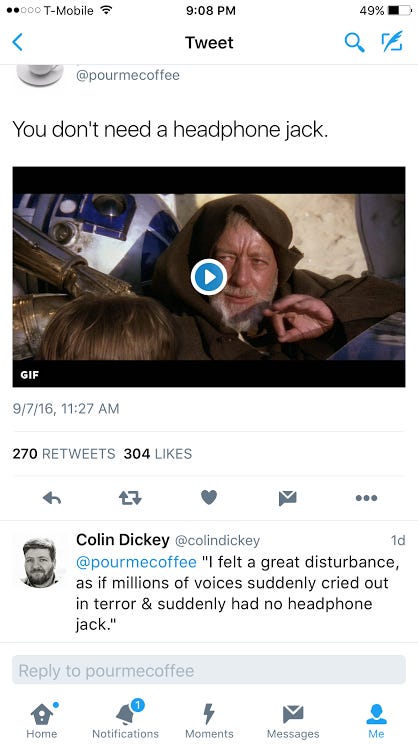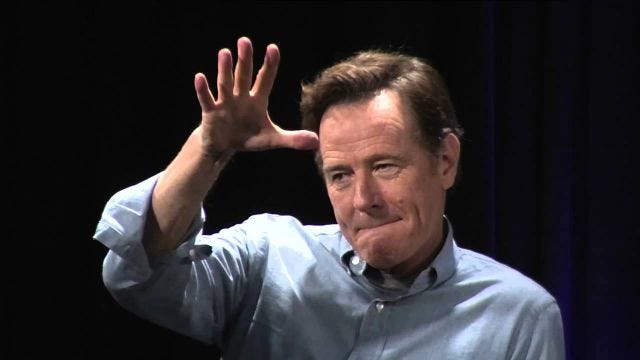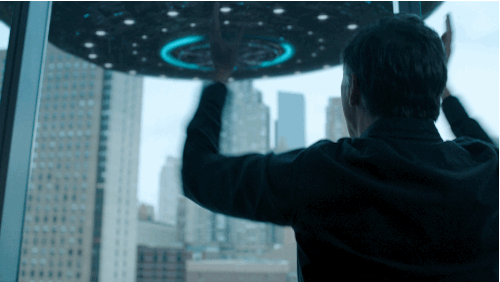EPISODE 109: STARRING MOTHER TERESA, PHILIP SEYMOUR HOFFMAN AND THE BITTERSWEET APPLE-SHAPED TEARS OF MY DISILLUSIONMENT
POP CULTURE SPIRIT WOW
On Wednesday Apple had its twice annual Field Distortion Replenishment Festival/Product Launch, at which its head dreamer Tim Cook stands before a rapt audience and tells them how their lives are about to change once again for the better.*
*Who am I kidding, this is me at the possibility of going to an Apple Launch:

This year’s announcements, however, did not go down so well. (Re that last link: Wow, Guardian. Just, wow.)
A favorite tweet (from @pouremecoffee):

(Top points for that first commenter, too. Proud of you.)
Apple Vice President Phil Schiller described the move to get rid of the headphone jack as "courageous". Phil, the only thing to do with headphones ever going to constitute “courage” is forcing yourself not to scream when you’re at Starbucks and someone believes they are in their office having a business meeting on their phone while wearing their weak-reception, always tangling iPhone headphones.
(Although sometimes I wonder—maybe a good little scream at this point is exactly what is needed.

I honestly have had to keep myself from doing this.)
There’s a lot to be said about how Apple has fooled us into thinking of it in the terms of a religion—it’s about magic and wonder and ultimate things--rather than what it is, a 21st century version hardware store. Sears, designed as a modernist temple.
And it seems at this point more than fair to say – although I think many true believers will rail against it, just as many Catholics will resist the from-everything-I hear-equally-true proposition about just saintificated* Mother Teresa – that Steve Jobs was not a nice person. At all. That in fact he was at various times a bully and liar and a thief.
*Sanctioned? Holied? Bedazzled?
(Mother Teresa, on the other hand, showed an extraordinary willingness to sacrifice and be present to some of the most overlooked and in need people in the world. She offered an amazing example.
But look around and you will also find stories of how ridiculously hard she could be on her sisters, how she seemed at times more interested in indoctrinating the sick into the faith than providing quality care for them, and that her high profile in the Church came in part from Pope John Paul II’s desire to raise up Catholics who reemphasized his own at times inhumane, ideological post-Cold-War-Eastern-European Christianity.)

When I die me and JPII gonna have words, Walter White style, yo.
Also, do any of us really believe even today that Apple’s workers in China are actually well paid and well treated in anything near approaching what we would mean by those terms? Really?
Think of what we allow Amazon to get away with in terms of its workers so that we can get our special-smelling British soaps in two days and at dirt poor prices? Are we really thinking Apple workers living on the other side of the globe are doing better?

Who knows. Maybe they are. But what seems far more likely is that the company maintains the minimum standard required not to get attacked by the West, and yet still far below what any of us would tolerate ourselves. Because that’s the way the world works; we are all living our great dream of the future on the backs of millions of unseen others who at best get to read about it, and at worst get to die for it. Just like every other generation since the wheel.
Some people fear when we get to the pearly gates we’re going to be held accountable for things like the way we treated our spouses or our coworkers. I tend to think God is going to be a lot more forgiving than that; but if he were to come down all Samuel L. Jackson Old Testament style, I would not be surprised if the list of people we crossed is almost entirely people we never even met, but whose lives we kind of enabled to be crappy.
Too dark? Maybe too dark.

And yet, despite all of what I just said, it’s also true that since their origins Steve Jobs and Apple have tapped into our fundamental sense of hope and possibility and wonder. As much as we all grumble that the world is a mess and Donald Trump is going to ruin everything and a morning TV personality has no business interviewing candidates for president about their foreign policy experience--

Seriously, NBC, what were you thinking?
-- On some level we’re all still kids hoping—no, believing that magic is real, and wanting to have some for ourselves. And Apple was not only able to pawn themselves off as that, with their amazing sense of design and spectacle, they actually were agents of it. The iPhone is extraordinary. It really did change everything. I just got an iPhone 6S+, and I have to say, I seriously have to stop myself from trying to use it to cast spells because I feel like a freaking wizard.
So, it’s not like there’s not still magic here.
The problem today is that Apple really has not been able to keep itself to that standard of the next big (aka life-changing magical) thing. Last year’s Apple Watch was more jewelry than wand: It may some day be the next big thing – certainly “wearables” (which to me sounds like something that you ask your 5 year old to put on rather than tech you wear) are mentioned so often you could get drunk on their mentions as a drinking game. But it’s not that now.
And yesterday Apple’s big announcement was even less dramatic. Wireless headphones? Scratch that – super expensive, almost certain to get broken or lost wireless headphones that work by way of bluetooth, which means that if your signal gets interrupted you can’t listen to your music.
Again, maybe some amazing innovation will come of this. But this isn’t it. In fact, it’s more clearly than ever just another way for Apple to make money, as it effectively keeps you from using even just headphones from other companies.
(Seriously, this is the kind of thing most companies would only do right before they go under. “We haven’t paid anyone in a month. We’re hyper-extended. What do we do?” “I don’t know. Can we milk the headphone jack? Or should I just run for president and blame everyone else?")

"P.S. Christ Loves It When You Buy a Rifle."
There’s just not that much sense right now of the company being that agent of change and goodness that it sold us on, or that the future is going to continue to be better and awe-some and beautiful.
But you know, sometimes disillusionment isn’t a bad thing. The world could do with more of us stepping back and thinking critically about Silicon Valley and its default “We don’t need test or ask permission or think through anything because we’re making the world better.” Google is selling the data from our every search, our every email to advertisers; Facebook’s the same way. Twitter, poor thing, hasn’t figured out how to make the big money yet – and yet I must say I like it the most, even if people are allowed to be on there saying their hateful things.
(I recently read a Twitter battle between pharmaceutical exec and current America poster boy for greed, Martin Shkreli, and the the internet’s favorite uncle, Patton Oswalt, in which to prove he's a great guy Shkreli retweeted this story of a sick kid he had helped at no benefit to himself (other than this tweet that he’s writing right now to try and make himself look good):

It made me wish that everyone would tweet at Shkreli stories of people that could use his drugs but can't afford them. Not to be sarcastic, but just to ask for help. He says he’s this great benefactor. So benefact, then.)
We’ve gotten pretty good at this point at being initially skeptical of the claims of big institutions like the banks, governments or religious organizations. (I can’t tell you how many conversations I have with older Catholics in which they worry about how little younger Catholics seem interested in just plugging back into the Church, even after the example of Pope Francis. “Have you not been following the news the last fifteen years”, I think to myself. “Do we really want people to go back to blindly accepting whatever we say?”)

Yet there’s still something inside us that wants to believe, that needs a Mother Teresa to be not only good but perfect or for Apple to be not only cool but beneficient, even though it’s charging us ridiculous prices for its services. And that doesn’t serve us.
+

Speaking of brutally life-affirming disillusionment: I just stumbled onto “Happyish”on Netflix. Do you know it? Don’t feel bad if you don't; it only lasted one season on Showtime, and its biggest claim to fame really was that it was the show Philip Seymour Hoffman was supposed to do and then-

Dammit.
It turns out, despite the fact that Hoffman died and the show chose to include an atomic bomb blast in its print ads--note to self: if you're not "Dr. Strangelove", you just can't pull off an atomic bomb blast in your ad campaign--it’s kind of great.
It’s about this middle aged ad exec and his wife fighting to be happy in our insane hyper-commercialized world, even as his job is trying to sell that world to people. Each episode has fantastic fantasy sequences – like this one in which the main characters each imagine rather than humans they are in fact aliens from another world who for some reason have been stuck here, and then watches as their ship comes back:

And then -- of course -- doesn't take them.
Each episode also offers as title cards not the cast members (who include the great Steve Coogan, Kathryn Hahn, Bradley Whitford and Ellen Barkin) but historical figures. (Personal favorite: Episode 102, “Starring Marc Chagall, Abuela and Adolf Hitler”, which has within it one of the great takedowns of Dora the Explorer. SCREW YOU, ABUELA.)
The show is pretty much the antidote for anyone who loved “Mad Men”, with incredibly disturbing pitches (based it would seem on creator Shalom Auslander’s actual experiences as an ad exec) in which members of the company pitch ISIS or Hitler as brands that have been enormously successful and tries to capitalize on the lessons that can be learned from them.
Great short clips (which are NSFYFYO—Not Safe For Your Five Year Old): On Pepto Bismo’s Twitter presence, Jesus’ joy ceiling, and, just to bring it all full circle, the iPhone.
Give it a shot, is what I'm saying.
+

I’m really excited about next week’s newsletter. Not long ago I mentioned “kahlil”, an online comic book retelling the Superman story in a Pakistani context. It’s both well told and visually gorgeous. I highly recommend it.
So anyway, I reached out to its creator, Kumail Rizvi, who works as an architect in the U.K., and he has kindly agreed to answer a couple questions about the project. And I said I'd only ask him five and then I sent him like a dozen and he answered all of them. Seriously, this is a stand up guy.
So look forward to that, and a couple other thoughts from me about Superman (and why stories about him almost never work any more), next week.
+
No more links today, other than this amazing analysis of why "Rogue One" has a black R2-D2 look-alike (#DarthDetoo) that is not an R2-unit.
Have a great week. Try not to Yuk Someone Else’s Yum.

